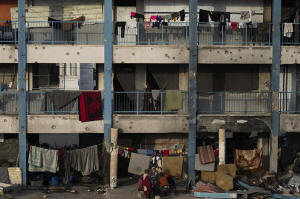Israel cuts off electricity supply to Gaza, affecting a desalination
plant producing drinking water
[March 10, 2025]
By MELANIE LIDMAN and SAMY MAGDY
TEL AVIV, Israel (AP) — Israel cut off the electricity supply to Gaza,
officials said Sunday, affecting a desalination plant producing drinking
water for part of the arid territory. Hamas called it part of Israel's
“starvation policy."
Israel last week suspended supplies of goods to the territory of more
than 2 million Palestinians, an echo of the siege it imposed in the
earliest days of the war.
Israel is pressing the militant group to accept an extension of the
first phase of their ceasefire. That phase ended last weekend. Israel
wants Hamas to release half of the remaining hostages in return for a
promise to negotiate a lasting truce.
Hamas instead wants to start negotiations on the ceasefire’s more
difficult second phase, which would see the release of remaining
hostages from Gaza, the withdrawal of Israeli forces and a lasting
peace. Hamas is believed to have 24 living hostages and the bodies of 35
others.
The militant group — which has warned that discontinuing supplies would
affect the hostages — said Sunday that it wrapped up the latest round of
ceasefire talks with Egyptian mediators without changes to its position.
Israel has said it would send a delegation to Qatar on Monday in an
effort to “advance” the negotiations.
Israel had warned when it stopped all supplies that water and
electricity could be next. The letter from Israel's energy minister to
the Israel Electric Corporation tells it to stop selling power to Gaza.
The territory and its infrastructure have been largely devastated, and
most facilities, including hospitals, now use generators. Hamas
spokesman Hazem Qassam said that Israel has ”practically” cut off
electricity since the war began and called the latest decision part of
Israel's “starvation policy, in clear disregard for all international
laws and norms."

The desalination plant was providing 18,000 cubic meters of water per
day for central Gaza’s Deir al-Balah area, according to Gisha, an
Israeli organization dedicated to protecting Palestinians’ right to
freedom of movement. Executive director Tania Hary said that it's
expected to run on generators and produce around 2,500 cubic meters per
day, about the amount in an Olympic swimming pool.
Israel’s restrictions on fuel entering Gaza have a larger impact, Hary
said, and water shortages are a looming issue, because fuel is needed
for distribution trucks.
Israel has faced sharp criticism over suspending supplies.
“Any denial of the entry of the necessities of life for civilians may
amount to collective punishment,” the U.N. human rights office said
Friday.
The International Criminal Court said there was reason to believe Israel
had used “starvation as a method of warfare” when it issued an arrest
warrant for Prime Minister Benjamin Netanyahu last year. The allegation
is central to South Africa’s case at the International Court of Justice
accusing Israel of genocide.
Israel has denied the accusations, saying it has allowed in enough aid
and blaming shortages on what it called the United Nations' inability to
distribute it. It also accused Hamas of siphoning off aid.
The leader of the Iranian-backed Houthi rebels in Yemen, Abdul Malik
al-Houthi, warned Friday that attacks against Israel-linked vessels off
Yemen would resume within four days if aid doesn't resume to Gaza. The
Houthis described their earlier attacks as solidarity with Palestinians
there.
The ceasefire has paused the deadliest and most destructive fighting
ever between Israel and Hamas, sparked by the Hamas-led attack on
southern Israel on Oct. 7, 2023. The first phase allowed the return of
25 living hostages and the remains of eight others in exchange for the
release of nearly 2,000 Palestinian prisoners.
[to top of second column]
|

Displaced Palestinians live in a school run by UNRWA, the U.N.
agency helping Palestinian refugees, west of Gaza City, Sunday,
March 9, 2025. (AP Photo/Jehad Alshrafi)

Israeli forces have withdrawn to buffer zones inside Gaza, hundreds
of thousands of displaced Palestinians have returned to northern
Gaza and hundreds of trucks of aid entered per day until Israel
suspended supplies.
US envoy describes talks with Hamas
The White House on Wednesday made the surprise confirmation of
direct U.S. talks with Hamas.
On Sunday, envoy Adam Boehler told Israeli broadcaster Kan that
Hamas has suggested a truce of five to 10 years while it would
disarm. The militant group has previously called disarming
unacceptable.
A senior Hamas official, speaking on condition of anonymity to
discuss contacts with the U.S., said that the group had expressed
its longstanding position that it would lay down its arms in return
for a “fair and just solution” that includes an independent
Palestinian state.
Boehler also told CNN that “I think you could see something like a
long-term truce, where we forgive prisoners, where Hamas lays down
their arms, where they agree they’re not part of the political party
going forward. I think that’s a reality. It’s real close.”
When asked if he would speak with the militant group again, Boehler
replied, “You never know.”
He added: “I think something could come together within weeks,” and
expressed hope for a deal that would see all hostages released, not
only American ones. Boehler has said four of the five American
hostages in Gaza are dead, with Edan Alexander alive.
Hamas on Sunday didn't mention the talks, but reiterated its support
for a proposal for the establishment of an independent committee of
technocrats to run Gaza until Palestinians hold presidential and
legislative elections.
Hamas’ attack in October 2023 killed around 1,200 people, mostly
civilians, inside Israel and took 251 people hostage. Most have been
released in ceasefire agreements or other arrangements.
Many Israelis are pressing for a deal to bring everyone home. “We
are here to send a clear message to the Israeli government: stop
stalling,” Zahiro Shahar Mor, nephew of slain hostage Avraham Munder,
said in front of tents set up outside Israel’s defense ministry in
one demonstration.
Israel’s military offensive has killed more than 48,000 Palestinians
in Gaza, mostly women and children, according to Gaza’s Health
Ministry, which doesn’t say how many of the dead were militants.
With the cutoff of supplies to Gaza, Palestinians are reporting
sharp price increases for dwindling items during the Muslim holy
month of Ramadan.
“Since the ceasefire began, the situation has improved a little. But
before that, the situation was very bad,” said Fares al-Qeisi in the
southern city of Khan Younis.
___
Magdy reported from Cairo.
All contents © copyright 2025 Associated Press. All rights reserved
 |